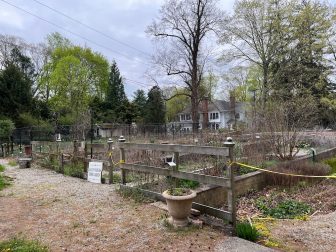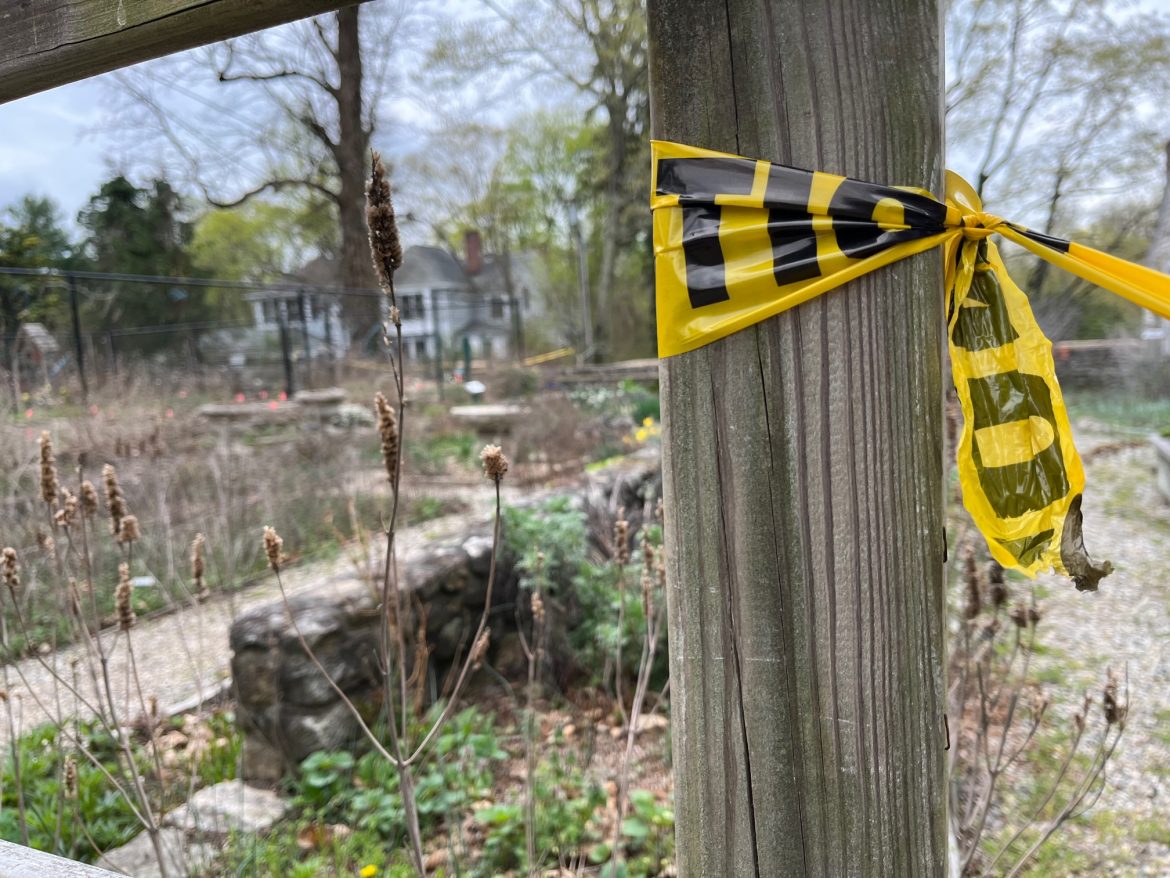Officials on Tuesday approved an approximately $19,000 with a Norwalk-based company following the discovery of lead in the soil of a community garden on a town-owned property.
The discovery of elevated levels of lead at in the New Canaan Nature Center’s community herb garden requires the removal and disposal of existing wood from raised beds, the spreading and grading of existing soils, placement of a filter fabric on top of the soils and capping the entire area with two inches of stone, officials said during the Board of Selectmen’s regular meeting.

The Community Garden at the New Canaan Nature Center on April 18, 2023. Credit: Michael Dinan
“We recently had the gardens tested and unfortunately they came in with lead levels that were elevated, so that they were no longer able to be utilized for a community garden,” Public Works Director Tiger Mann told the selectmen at the meeting, held in Town Hall and via videoconference.
“They weren’t to the point where they need to be removed or they need to be permanently capped,” he continued. “The direction from the Health Department was that we can close the area, place a filter fabric over the top of it and then two inches of stone and then reutilize the area for other purposes. Whether we put in elevated beds at that point in time—the beds could be on a table where they can then garden off of that—or utilize the area for a gathering space or other programming space for the Nature Center, but we can’t necessarily dig into the soil. So we’ve got to cap the area and move forward from there.”
First Selectman Kevin Moynihan and Selectmen Kathleen Corbet and Nick Williams voted 3-0 in favor of an $18,975 contract with Hussey Bros Excavating to complete the work.
The selectmen asked what prompted the town to test the soil in the area (a gardener on the property had an initial test done in a former gardening area, and when that came back with elevated levels the town expanded the testing), whether that gardener does such testing on a regular basis (don’t know) and how many plots there are in the community garden (16, according to a map of the area).
The elevated levels of lead first were discovered at the Nature Center in October, Mann said.
New Canaan Health Director Jenn Eielson noted during the meeting that none of the elevated levels were found in the area of the licensed daycare at the Nature Center. Eielson added that as soon as the lead was discovered, she notified officials in the state Office of Early Childhood and Department of Public Health, and that she ran Zoom meetings with those with gardening plots in the affected area, as well as Nature Center board members. A letter also went out to parents, Eielson said, appearing to refer to the families of kids at the organization’s daycare.
Asked about the lead contamination, New Canaan Nature Center Executive Director Bill Flynn told NewCanaanite.com in an email: “As soon as the nature center learned from a soil sample that there was lead present in the garden area we immediately reached out to Town. The Nature Center was grateful to the quick response from Town, and that they responded thoughtfully and cooperatively to resolve the issue. Further testing was done in the surrounding areas to confirm that the lead was only in the gardens. We are currently looking into relocating the community garden.”
Asked whether the town knows the history of the land in the contaminated area, Eielson said the whole property has a “lead management plan” because “all those buildings there have lead in them.”
“As part of the state health department requirements for a licensed daycare, they have a management plan, an environmental consultant comes every year, he knows which items have to be checked,” she said. “In this case, because it’s not part of the daycare but it used to be an old greenhouse, we’re not really that shocked to find it. But to clarify, it’s not the greenhouse area that we just took down a couple of years ago. This is ancient and lead doesn’t leave the soil. And it’s not magically occurring either.”
Typically, with a residence such as the home located next to the community garden, lead can occur “along the drip line of the house,” Eielson said, because that’s where the bare soil is “and the water coming down and the paint leaches into the soil.”
“So in this case, you can’t have any bare soil,” she said. “Part of the remediation is, you can do sod, you can do wood chips, you can do stone. Mulch is never a good idea because it washes away too easily and the thought here is if we put down sod, someone after we’re long gone is going to come along and re-dig in that area all over again where again it’s still on file, they know exactly where everything is but this way, with this, the gardeners don’t dig into anything.”
In adults, lead normally “flushes through your system faster,” and grownups—unlike children—tend not to put their hands in their mouths during activities such as gardening, according to Eielson.
“With children, they’re always touching everything and putting their hands in their mouth and it bioaccumulates in their body,” she said. “I did, on that Zoom call with all the gardeners, I did recommend a simple blood test they can get with their doctors to find out if they have elevated blood lead levels. The herb garden—no one ate the herbs they just, I guess, grew the herbs. Because they still wanted to use the area and we explained that they can’t because of the soil. There’s 40 other acres.”
Williams said by way of summary: “So the moral of the story is don’t garden and put your hand in your mouth afterwards.”
Eielson noted that, because material from the town’s mulch pile had been used in the community garden, that mulch was tested and came back “completely clean.”
“So that was a relief to us, and they [the contaminated soils] really are only in that area,” she said. “And we did make it clear to the gardeners and to the Nature Center: No bringing in any mulch from any place else.”
